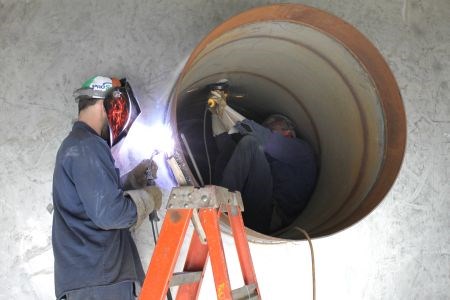As Felix Lopes Jr. looks to steer his family-run company into new, expanded markets, he's thinking on an Olympic-sized scale. And the recent completion of a major fabrication project has put him at the top of the podium.
Lopes Mechanical Inc., based out of Coniston, just completed the fabrication of a $3-million converter, a component used in emissions reductions, for a facility in Virginia. It, and its predecessor, a similar component built for Xstrata Nickel in Sudbury, has led to additional contracts with a U.S. company that is impressed with the quality and efficiency of the work.
“It's brought us the gold medal,” Lopes said. “Once you do something new that has never been done, everybody hears about it, everybody's watching you. That's what happened to us.”
Typically converters are built in pieces and erected on site, but their completion is at the mercy of the weather, explained project manager Ryan Schill, Lopes' industrial coordinator. Lopes' challenge was to fabricate the component in fewer pieces to enable a faster on-site construction.
The result is a stainless steel converter measuring 80 feet tall with an external shell of 44 feet and an internal core of almost 20 feet. The company was successful in its goal, fabricating the equipment in halves, essentially reducing the fabrication time required on site by half.
Upon inspection, an American quality control assessor called it “bar none, the best fabrication he's seen,” Schill said.
“Ultimately this was a good project for us to flex our muscles, to show the size and the weight that we can handle, the ability to weld this much stainless steel and to hold tight tolerances,” Schill said. “Once it leaves our shop, we lose control over it, so it has to be perfect when it leaves our doors.”
A rehabilitated rail spur from the CP line leading onto the Lopes facility is being used to transport components from the shop directly to the job site.
“Having this rail access eliminates borders for us,” Schill said. “It's easy to get product anywhere now; the rail line infrastructure's already there and all we've done is tapped into it. So that's opening up these markets to us.”
The projects were expedited, in part, by $1 million in funding from the Northern Ontario Heritage Fund Corp. (NOHFC) which went towards the construction of a clean shop, a 7,200-square-foot stainless steel facility that allows the company to fabricate larger, more complex projects.
An expansion of the facility was already in the planning stages, but the funding gave Lopes the capital needed to move forward. The addition has allowed the company to hire 12 additional permanent, full-time employees.
That good fortune has trickled down to other, local businesses, which have benefitted from Lopes' prosperity, such as the company hired to shrink-wrap the components for shipping, which has had to hire an additional three workers to keep up with demand, Lopes noted.
Throughout the 2010 Vale strike and the economic downturn, good planning and foresight has kept Lopes competitive. While most companies were laying off workers and putting a hold on building infrastructure, Lopes invested $1 million and kept 50 of its workers employed while expanding its facility.
When the economy started to recover and other companies were playing catch-up, the business was ready and able to serve its client base, Lopes said. Today, the company continues to stay ahead of the curve, putting an emphasis on hiring young people and training, even keeping a teacher on staff to guide new employees.
As companies look to increase volume, replace aging equipment, or meet stricter environmental standards, Lopes and Schill expect their converters to become standard in the industry, and their clean shop will be the key to opening up new markets, nationally and globally.
“That facility is giving us opportunities to do other work that no companies can do in town or in Ontario because we have the right infrastructure for it,” Lopes said. “Now the industry knows who we are, what we can do and how well we can do it.”




